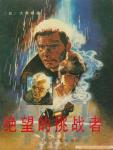Chapter 1 Preface Author and Work Introduction
Haruhiko Ohyabu (1935-) is a famous contemporary Japanese writer. One of the representative writers of "hard-boiled".In the 10th year of the Showa era, he was born in what is now Seoul, South Korea.
His childhood was at the end of the Second World War and when the Soviet army broke into the Korean battlefield.Like all the Japanese living in North Korea at that time, he experienced the hard years of hunger and cold brought about by the defeat?When he was eleven years old, he followed his family to hire a "black market boat" and returned to his hometown of Japan.The harsh experience of war made him distrust and rebel against state power.
Yabu did not start elementary school until he was twelve.His hometown, Kagawa County, had a very strong atmosphere of exclusion at that time.He changed schools many times for this.And every transfer is always accompanied by fights with other students.Once, Da Yau had his head broken, and the blood flowed all over the washbasin.The fiery struggle that he showed in his later creations can be said to have originated from that time.
In 1951, he was admitted to Kida Middle School in Kagawa Prefecture.He had to be admitted to the hospital because of another bony ulcer in his spine.On his hospital bed, he greedily read many progressive literary works.Especially Lermontov's "Contemporary Heroes" gave him a lot of inspiration.The germination of his literature was produced at that time.
In 1958, Yayabu wrote his debut novel "Damn Beast" when he was a third-year student at Waseda University. It was published in the fanzine "Aoen", and was strongly praised by Edogawa Ranpo.Thanks to Edogawa's recommendation, the first-class Japanese magazine "Gem" immediately reprinted this work.Soon after, "Damn Beast" was put on the screen again, which aroused extremely strong repercussions in Japan.Oh Yabu's status as a professional writer was solidified from the very beginning.At that time, he was only twenty-three years old.Since then until now, Yabu has published no less than fifty novels.Many of them have a circulation of more than five million copies.Moreover, almost all of his works have to be reprinted ten times in a few years-dozens of times.His main works include: the "contemporary" full-length masterpiece "The Awakened Golden Wolf", "Ballistic of Revenge", "City of Beasts", "The Tainted Hero" and so on.
Da Yabu has his own distinct characteristics in terms of creative style.The artistic characteristics of the ruthless school are: without the slightest emotion, it often takes the tenacious private detective who faces reality ruthlessly as the protagonist.Avoid psychological description as much as possible, and objectively describe the occurrence, development and results of characters and events.Da Mu inherited this artistic feature of Wuqing school novels, but added his own stuff.
The heroines of American ruthless writers, though stoic and stoic, are thoroughly conservative pro-state institutions, for better or worse.In the end, they will all fall into the narrow patriotic framework that only cares about national order.The protagonist created by Yabu is not the same.Although they are lonely, they resolutely challenge the solid high wall representing the dark side of state power!
It is one of Yabu's outstanding masterpieces.
The protagonist Takeda hates his job of betraying the interests of the country, and he does not allow Japan to become a colony of the United States. Therefore, although he is alone and helpless, he still resolutely confronts the lackeys of Japan and the CIA who protect the interests of foreign automobile companies. a tenacious challenge.The killing of his beloved wife and daughter is ostensibly the opening scene of a tragedy that Takeda desperately challenges, but we can see from the work that there is more to it than that.Takeda hates the encroachment of Japanese enterprises by foreign capital; the monk hates being an accomplice of foreign capital and the traitorous slave who sells the country and the interests of the nation; Afterwards, a fierce attack was launched against these three forces.From the simple theme of personal revenge to the height of the nation and society, this is a positive and progressive side.
Haruhiko Ohyabu once said: "The ruthless school can be called 'ruthlessism'. It is to describe the ruthless modern society where the strong survive. There is no distinction between good and evil." His other works, All are concrete manifestations of his point of view.The protagonists all have anti-power and anti-social thoughts and launch a frenzied attack on the whole society when their desires are smashed by the wall of reality and they are finally completely forgotten by society.This is not unusual in modern capitalist society.Takeda also inherited this characteristic of the Ruthless School.But Haruhiko Ohyabu added something new.His personal revenge is subject to the premise of revenge against foreign capital, and his personal revenge is carried out in a desperate struggle with foreign capital forces.His enemies are no longer just a few people who killed his beloved wife and daughter, but all foreign capitals that have destroyed the Japanese auto industry and ravaged Japan's national dignity!To a certain extent, this represents the wishes of the Japanese people, and makes the protagonist have a positive and progressive meaning, instead of just the incarnation of perseverance and ruthlessness.
Although it is a historical record of a certain process and a certain aspect of Japan's post-war economic development, it has great historical value.However, because the author was born in a capitalist society, and what he describes is the reality of the contemporary capitalist world, this makes his works bear a strong brand of modern capitalist society.In the works, the sexual scenes are over-emphasized; some violent acts of the protagonist are too cruel, etc., to a certain extent, it damages the image of the protagonist.However, in any case, the iron and blood scenes of the annexation of Japanese national industries by foreign monopoly capital described in the works by the author help us to understand the essence of capitalism to a certain extent, and it still has positive significance.

